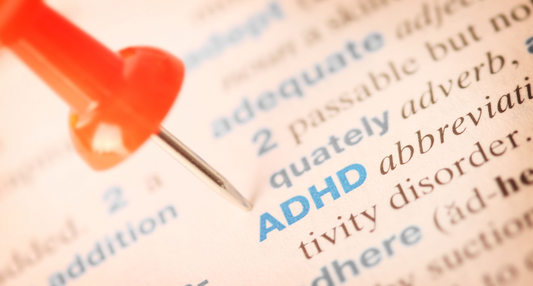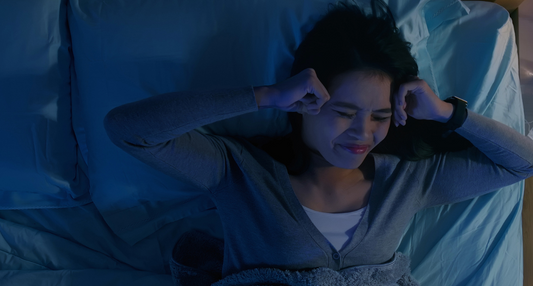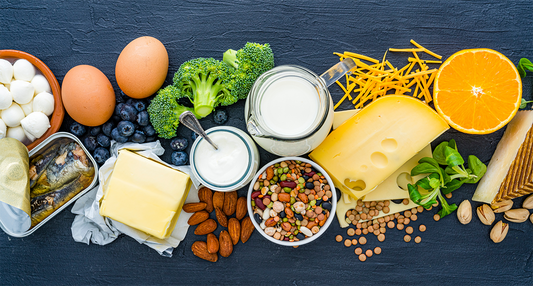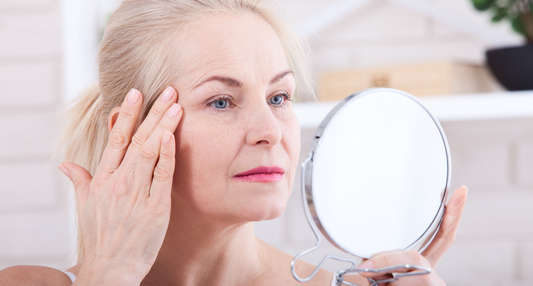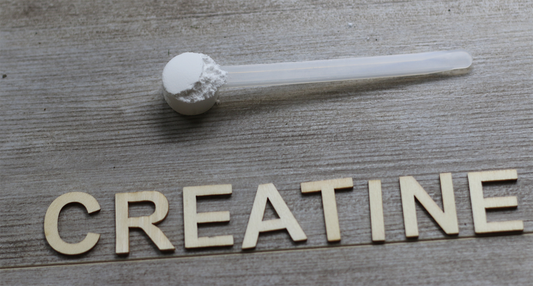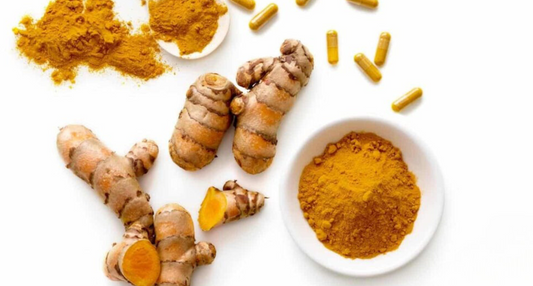7 Ways To Reduce Joint Pain In Menopause
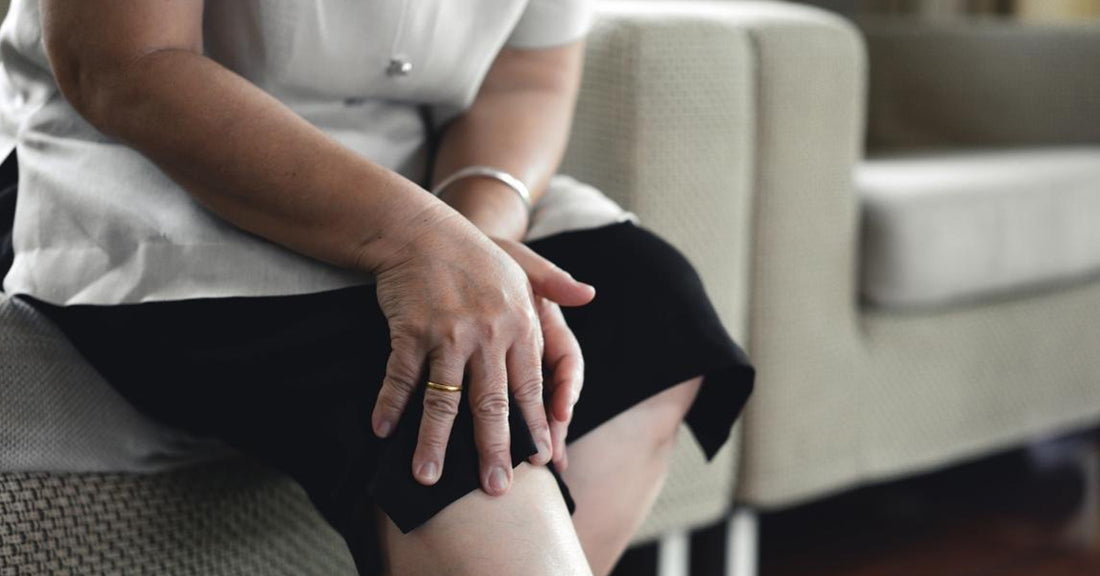
Share
Our bodies change throughout our lives, and the transition to menopause is perhaps the most significant change people experience. For many, the transition is accompanied by uncomfortable symptoms, such as joint pain. Don’t despair! Read on to learn how you can find relief.
What Helps Joint Pain During Menopause?
Menopause is associated with feelings of fatigue, and symptoms such as hot flashes, night sweats, brain fog, weight gain and much more. Joint pain in menopause is just one of the over 34 symptoms, and a reported 71% of perimenopausal women experience this kind of pain.1 With no intervention, it can hinder your lifestyle and restrict your activity. Here are a few simple lifestyle changes you can make to ease some of the discomfort of joint pain.
1. Regular Exercise
Getting regular exercise in your day is an excellent way to support your overall health and decrease your risk for potential health conditions like the following.2
- Cancer
- Heart disease
- High blood pressure
- Joint pain
- Type 2 diabetes
Exercising regularly can help your joints stay lubricated, allowing you to move more comfortably, and with ease. If your joints are particularly painful, try low-impact exercises like yoga or swimming. As you begin to feel better, you can work up to higher-impact activities if you’d like.
Taking some stretch breaks throughout the day can make a big difference in how you feel. Sitting at a desk all day can take its toll on our bodies — humans are built to move! So, move whenever possible. Simply standing up and marching in place can help stretch muscles that have tightened or gone unused for too long.
2. Get Better Sleep
How is your sleep hygiene? You should be aiming for 7-9 hours of sleep each night, but if your sleep is of low quality, your body may not have enough time to repair itself. In addition, a good night’s sleep helps to manage your stress levels, which if ignored, can contribute to back and neck pain, especially during menopause.3 Consider exercise, yoga, meditation or journaling to lower your stress levels. Refrain from using electronic devices, say no to a bedtime snack and avoid caffeinated beverages for several hours before bed. If possible, keep your bedroom dark and cool.4
Sleep is an important tool in your menopause toolkit. When your sleep is better, you will begin to notice a difference in how you feel when you’re awake.
3. Eating Anti-Inflammatory Foods
Chronic inflammation is a result of many factors, but we can reduce inflammation levels with an anti-inflammatory approach to nutrition. Enjoying a variety of fruits, vegetables, lean proteins and healthy fats that are as close to their natural state as possible, can help with joint pain during menopause.
By reducing or eliminating processed and refined foods, artificial colors and flavors and foods with preservatives and additives, you may notice a difference in a short amount of time. Alcohol, especially in excess, can causes inflammation all on its own.5
One of the main components of The Galveston Diet is an anti-inflammatory approach to nutrition which can help you fight inflammation and visceral – or belly fat.
4. Consider Hormone Replacement Therapy
Hormone replacement therapy (HRT) has been shown to reduce the frequency and severity of joint pain associated with the menopausal transition. Speak with your doctor about the options that may be appropriate for you. Here are some suggestions to help you get the conversation started.
Natural Remedies For Joint Pain In Menopause
We can change our habits to improve our health, but sometimes, supplementation becomes necessary. Following are my top two recommendations to consider.
5. Omega-3 Fatty Acids
These nutrients help us build healthy cell walls and ensure major organs like the heart and lungs function as they should. Having enough omega-3 fatty acids in your diet can lessen some symptoms of autoimmune and inflammatory conditions. They’re one of the essential natural remedies for joint pain in menopause because of how easily you can add them to your diet.
You can find these nutrients in fatty fish, nuts and seeds., If these are not foods you regularly consume, you can supplement with a high quality omega-3 fatty supplement such as The Galveston Diet Omega-3 Vitamin D & K.
6. Fiber
Fiber may not directly affect your joint pain, but it can help reduce your inflammation. Lower inflammation means decreased joint pain, and it can prevent the onset of arthritis.
You can find fiber in various foods, such as:
- Fruit, especially berries
- Vegetables, particularly cruciferous vegetables such as broccoli
- Whole grains, legumes and beans
You don’t need to omit foods you like to get enough fiber in your diet, however, you may need a fiber supplement, like The Galveston Diet Fiber GDX to ensure you’re getting the recommended 25 or more grams per day.
7. Turmeric
A polyphenol called curcumin is found in turmeric. This chemical, found in plant-based foods, can be extracted from turmeric and ingested as a supplement for health benefits. It acts as an antioxidant and may decrease the oxidative stress and inflammation that occurs with declining hormone levels during menopause.
Eliminating Joint Pain In Menopause
The Galveston Diet can help you ease menopausal symptoms like joint pain. You can learn more through my self-paced online course, The Galveston Diet Program or by reading my book, The Galveston Diet. No matter what, it’s important to know you’re not alone and that relief is possible.
References:
- https://www.ncbi.nlm.nih.gov/pmc/articles/PMC7710408/
- https://www.hss.edu/article_lifestyle-medicine-physical-activity.asp
- https://www.tandfonline.com/doi/full/10.3109/13697137.2010.483025
- https://www.cdc.gov/sleep/about_sleep/sleep_hygiene.html
- https://www.gatewayfoundation.org/addiction-blog/alcohol-immune-system/




